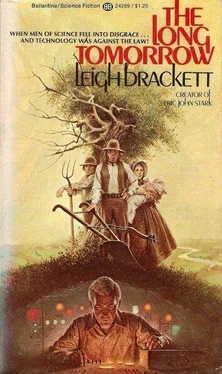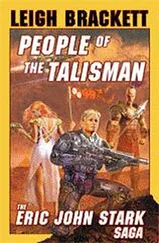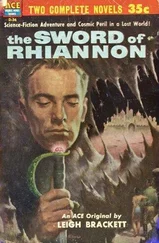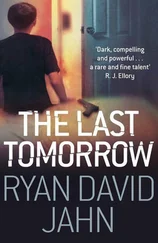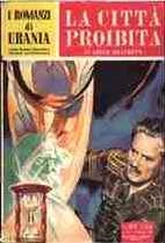“I ain’t whining.”
“Yes, you are. And if you’re worried about sinning, you ought to have minded your pa in the first place and stayed home in Piper’s Run.”
“He’s got you there,” said Hostetter.
Len grumbled, kicking pebbles angrily in the dust. “All right. It scared me. But it scared him, too, and I wasn’t the one that tucked my tail and ran.”
Esau said, “I’d run from a bear, too, till I knew it wouldn’t kill me. I ain’t running now. Listen, Len, this is important. Where else in the world could you find anything as important?” His chest puffed out and his face lit up as though the mantle of that importance had already fallen on him. “I want to know more about that machine.”
“Important,” said Len. “Yes, it is.” That’s true. There isn’t any question about that. Oh God, you make the ones like Brother James who never question, and you make the ones like Esau who never believe, and why do you have to make the in-between ones like me?
But Esau is right. It’s too late now to worry about the sinning. Pa always said the way of the transgressor was hard, and I guess this is part of the hardness.
So be it.
They left Esau at Sherman’s to pick up his bride, and Len and Hostetter walked on together toward Wepplo’s. The swift clear dusk was coming down, and the lanes were deserted, with a smell of smoke and cooking in them. When they came to Wepplo’s Hostetter put his foot on the bottom step and turned around and spoke to Len in a strange quiet tone that he had never heard him use before.
“Here’s something to remember, the way you remember that mob that killed Soames, and Burdette and his farmers, and the new Ishmaelites. It’s this— we’re fanatics too, Len. We have to be, or we’d drift away and live our own lives and let the whole business go hang. We’ve got a belief. Don’t tangle with it. Because if you do, even I won’t be able to save you.”
He went up the steps and left Len standing there staring after him. There were voices inside, and lights, but out here it was still and almost dark. And then someone came around the corner of the house, walking softly. It was the girl Joan, and she nodded her head toward the house and said, “Was he trying to frighten you?”
“I don’t think so,” said Len. “I think he was just telling me the truth.”
“I heard him.” She had a white cloth in her hands, as though she might have been shaking it just before. Her face looked white, too, in the heavy dusk, blurred and indistinct. But her voice was sharp as a knife. “Fanatics, are we? Well, maybe he is, and maybe the others are, but I’m not. I’m sick of the whole business. What made you want to come here, Len Colter? Were you crazy or something?”
He looked at her, the shadowy outlines of her, not knowing what to say.
“I heard you talk this morning,” she said.
Len said uncomfortably, “We didn’t know—”
“They told you to say all those things, didn’t they?”
“What things?”
“About what dreadful people they are out there, and what a hateful world it is.”
“I don’t know exactly what you mean,” said Len, “but every word of what we said was true. You think it wasn’t, you go out there and try it.”
He started to push past her up the steps. She put a hand on his arm to stop him.
“I’m sorry. I guess it was all true. But that’s why Sherman had you talk over the radio, so we’d all hear it. Propaganda.” She added shrewdly, “I’ll bet that’s why they let you two in here, just to make us all see how lucky we are.”
Len said, very quietly, “Aren’t you?”
“Oh yes,” said Joan, “we’re very lucky. We have so much more than the people outside. Not in our everyday lives, of course. We don’t even have as much, of things like food and freedom. But we have Clementine, and that makes up. Did you enjoy your trip to The Hole?”
“The Hole?”
“It’s a name some of us have for Bartorstown.”
Her manner and her tone were making him uneasy. He said, “I think I better go in,” and started once more up the steps.
“I hope you did,” she said. “I hope you like the canyon, and Fall Creek. Because they’ll never let you leave.”
He thought of what Sherman had said. He did not blame Sherman. He did not have any intention of going away. But he did not like it. “They’ll learn to trust me,” he said, “Someday.”
“Never.”
He did not want to argue with her. “Well, I reckon to stay awhile, anyway. I’ve spent half my life getting here.”
“Why?”
“You’re a Bartorstown girl. You shouldn’t have to ask.”
“Because you wanted to learn. That’s right, you said that this morning. You wanted to learn, and nobody would let you.” She made a wide mocking gesture that took in the whole dark canyon. “Go. Learn. Be happy.”
He got her by the shoulder and pulled her close, where he could see her face in the dim glow from the windows. “What’s the matter with you?”
“I just think you’re crazy, that’s all. To have the whole wide world, and throw it all away for this.”
“I’ll be damned,” said Len. He let her go and sat down on the steps and shook his head. “I’ll be damned. Doesn’t anybody like Bartorstown? Seems to me I’ve heard more griping since I got here than I ever heard in my lifetime before.”
“When you’ve lived a lifetime here,” she said bitterly, “you’ll understand. Oh, some of the men get out, sure. But most of us don’t. Most of us never see anything but these canyon walls. And even the men have to come back again. It’s like your friend says. You have to be a fanatic to feel that it’s all worth while.”
“I’ve lived out there,” said Len. “I think what it is now, and what it could be, if—”
“If Clementine ever gives them the right answer. Sure. It’s been almost a century now, and they’re no nearer than they ever were, but we’ve all got to be patient and devoted and dedicated—dedicated to what? To that goddamned mechanical brain that squats there under the mountain and has to be treated like it was God.”
She leaned over him suddenly, in the faint glow of the lamplight.
“I’m no fanatic, Len Colter. If you want somebody to talk to, remember that.”
Then she was gone around the corner of the house, running. Len heard a door open somewhere at the back. He got up, very slowly, and climbed the steps and went slowly into the house and ate his dinner at the Wepplos’ table. And he did not hear hardly anything that was said to him.
The next morning Len and Esau were called again to Sherman’s place, and this time Hostetter was not with them. Sherman faced them over the table in the living room, balancing two keys back and forth between his hands.
“I said I wouldn’t push you, and I won’t. But in the meantime you have to work. Now if I let you work at something you could do in Fall Creek, like blacksmithing or taking care of the mules, you wouldn’t learn anything more about Bartorstown than if you hadn’t left home.”
“Well, no,” said Esau, and then he asked eagerly, “Can I learn about the big machine? Clementine?”
“Offhand, I’d say she’s always going to be beyond you, unless you want to wait until you’re an old man. But you can take it up with Frank Erdmann, he’s the boss on that. And don’t worry, you’ll get all the machine you want. But whatever you pick will mean a lot of studying before you’re ready, and until then—”
He hesitated for only a fraction of a second, perhaps he didn’t really hesitate at all, and perhaps it was only by pure and unmeaning chance that his eyes happened to rest then on Len’s face, but Len knew what he was going to say before he said it and he set himself hard so that nothing would show.
Читать дальше
